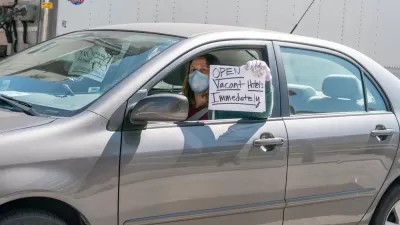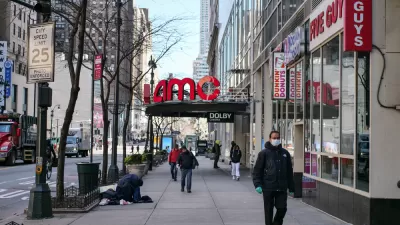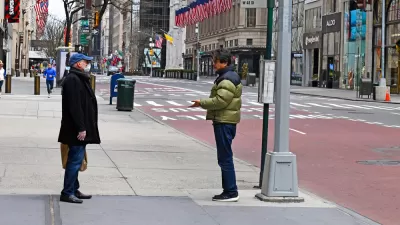Cities and counties have been slow to take advantage of the promise of full and retroactive FEMA reimbursement to expand emergency housing programs, frustrating housing advocates. What’s getting in the way?

Over the last year, thousands of unhoused and vulnerable people have moved from the streets or congregate spaces into hotel and motel rooms thanks to a bevy of emergency housing programs aimed at reducing the spread of COVID-19. Shelterforce recently wrote about how these programs worked, and why some local governments were now purchasing hotels for long-term housing.
Though the need is still great, some of these emergency housing programs are winding down due to funding issues.
FEMA had been reimbursing cities, counties, and states 75 percent of the cost for COVID-related non-congregate shelter, but once other sources of funding ran out—like those provided by the federal CARES Act—local governments opted to shutter their hotel and motel lease programs.
There was cause for celebration earlier this year when the Biden administration announced that FEMA would provide 100 percent reimbursement for non-congregate shelter, retroactive to the start of the pandemic and through Sept. 30, 2021. Advocates said the move would make a major difference in the availability of COVID-safe shelter. “It will enable states and communities to address the urgent health and housing needs of people experiencing homelessness and other residents of congregate facilities during the pandemic,” the National Low Income Housing Coalition said in a statement after the announcement.
But cities and counties have so far been slow to take advantage of the promise of full and retroactive reimbursement to expand these emergency programs, frustrating many housing advocates. According to an investigation by Grist, only 23 local governments have submitted funding requests as of early April. What’s getting in the way?
FEMA Fears
It turns out several things are, among them the fact that ...
FULL STORY: FEMA Offers Full Reimbursement for Pandemic Shelter Costs—But Cities Are Still Jittery

Maui's Vacation Rental Debate Turns Ugly
Verbal attacks, misinformation campaigns and fistfights plague a high-stakes debate to convert thousands of vacation rentals into long-term housing.

Planetizen Federal Action Tracker
A weekly monitor of how Trump’s orders and actions are impacting planners and planning in America.

In Urban Planning, AI Prompting Could be the New Design Thinking
Creativity has long been key to great urban design. What if we see AI as our new creative partner?

How Trump's HUD Budget Proposal Would Harm Homelessness Response
Experts say the change to the HUD budget would make it more difficult to identify people who are homeless and connect them with services, and to prevent homelessness.

The Vast Potential of the Right-of-Way
One writer argues that the space between two building faces is the most important element of the built environment.

Florida Seniors Face Rising Homelessness Risk
High housing costs are pushing more seniors, many of them on a fixed income, into homelessness.
Urban Design for Planners 1: Software Tools
This six-course series explores essential urban design concepts using open source software and equips planners with the tools they need to participate fully in the urban design process.
Planning for Universal Design
Learn the tools for implementing Universal Design in planning regulations.
Gallatin County Department of Planning & Community Development
Heyer Gruel & Associates PA
JM Goldson LLC
City of Camden Redevelopment Agency
City of Astoria
Transportation Research & Education Center (TREC) at Portland State University
Jefferson Parish Government
Camden Redevelopment Agency
City of Claremont





























